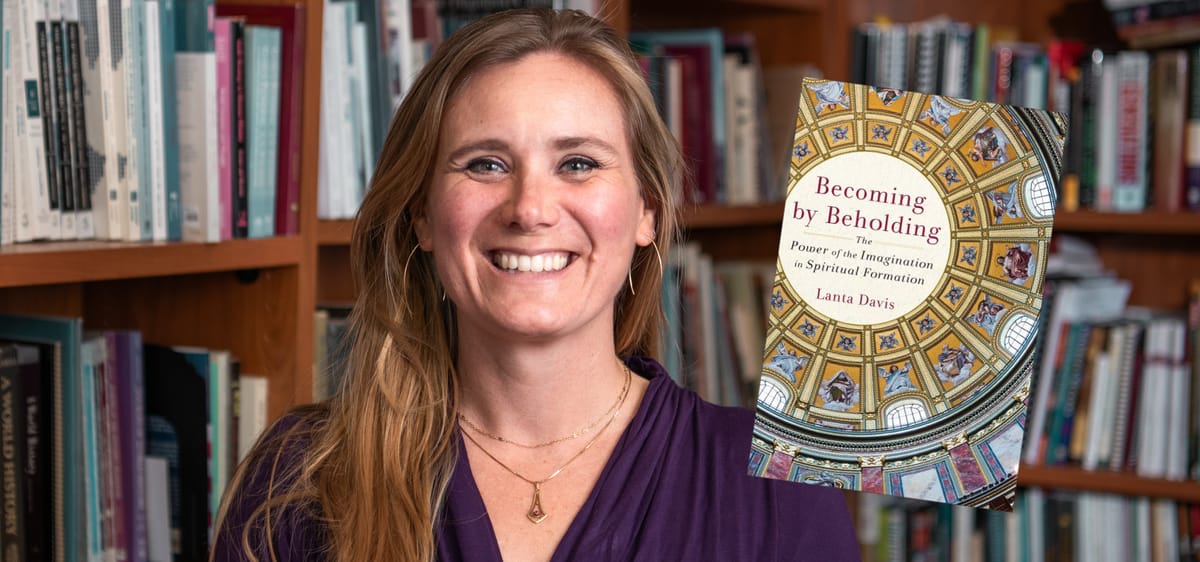Becoming by Beholding: Dr. Lanta Davis & the Lost Art of the Imagination

Exploring the ancient city of Rome, Dr. Lanta Davis encountered statues of the virtues, wandered secluded catacombs, and saw countless centuries-old art works demonstrating the importance of art in the historical Church. These experiences served as a powerful awakening to the traditional role of the imagination in spiritual formation, and the drastic extent to which modern Christianity overlooks it. This topic influences much of Dr. Davis’ work as a professor at Indiana Wesleyan University and is the central focus of her new book Becoming by Beholding: The Power of the Imagination in Spiritual Formation, publishing on July 30 from Baker Academic.
Dr. Lanta Davis has served as an invaluable member of the John Wesley Honors College faculty for eight years, teaching “Rhetoric and the Sacramental Imagination”, “What Is Beauty?”, and “Great Texts” as she guides students towards loving both God and neighbor better. Her experiences with these courses serve as the other major inspiration for her book and gave her ample time to marinate on the concepts her trip to Rome exemplified. Creating Becoming by Beholding was a six-year journey of forming the central idea, gathering research, developing the sections, and finally writing the book itself. Ironically, the section which took the longest to finish was the introduction—Dr. Davis says she wrote more than twenty versions before her husband forced her to settle on one.
Becoming by Beholding exists in conjunction with the Honors College as the two influence each other. In her classes, Dr. Davis explores the historical traditions the Church passes down through time and the specific ways the Holy Spirit supports believers throughout time. These classes also examine awe, wonder, goodness, and beauty in the world. Dr. Davis argues the imagination is one of the best tools Christians can use for these examinations. In both Becoming by Beholding and her classes, Dr. Davis redefines the imagination. While often associated with our mind’s creations in modern times, Dr. Davis argues the imagination was historically associated instead with what we allow into our minds. Imagination affects our sense of identity because the things we think about influence our view of reality.
In Dr. Davis’ words, “Imagination is the architecture we hang our identity on.” One example she describes this with is our soul as wax, with the imagination as the stamp which shapes and defines us. Historical Christians knew about the impacts of the imagination and used it as a tool for spiritual formation, as shown through a variety of examples detailed in the book. One example many Christians are at least partially familiar with is the Christian fish symbol, the ichthys. This symbol is not just a reminder that Christians are fishers of men–the word “ichthys” itself is a Greek acronym reminding Christians of Jesus’ identity–Jesus (i) Christ (ch) God’s (th) Son (y) savior (s). Anchors, palm branches, and phoenixes are additional examples of symbols historical Christians devised to impress Biblical truths on their imaginations. Many Christians also employed art like paintings and sculptures to aid in the memorization of scripture and understanding of truth.
Becoming by Beholding argues the change in our perspective on the imagination happened during the Reformation through early Protestants attempting to distance themselves from Catholic iconography by removing art entirely. This unintentionally resulted in imaginations seeking food in less spiritually nourishing places.
Because the imagination is so foundational to our lives, Christians must ensure ours are well-fed. Dr. Davis posits the imagination is the lens we look through to see God’s character reflected in His creation. This concept also comes from historical Christians, who exemplified it with books about animals and their connections to God called bestiaries—a topic which Dr. Davis dedicated a section of Becoming by Beholding to exploring.
What happens when we don’t feed our imaginations properly is seen in what Becoming by Beholding calls “diseased cultural forms.” Two specific examples given are nationalism and consumerism. Overabundant nationalism makes us focus on our worldly home more than our Heavenly home. Rampant consumerism causes us to rely on constant entertainment and accumulating possessions to the point where our love of worldly things gets in the way of our love for others and our need for entertainment becomes the metric we judge worship by. This last issue is especially concerning, because it causes Christians to see issues with the Church they attend or with themselves if they don’t feel entertained during services. An underdeveloped imagination harms our worship of God, showing just how essential a healthy imagination is, spiritually.
Studying virtues and their depictions is a way to feed our imaginations. The virtues are often portrayed as women with a variety of symbols to provide memory aids and train the mind to identify subtext. Because humans reflect the behavior we see, having visual models for abstract concepts can be helpful. While courage is abstract, portrayals in sculptures and paintings show courage is hopeful, persevering, and often embodied by continuing through struggles without despairing.
Pairing virtues and vices can help us understand them better and often reveals them as opposites of each other. Wrath is often seen as just anger, but historical depictions of it, like Dante’s Inferno, paint it as a force which obscures and blinds—not just anger, but an overabundance of anger keeping us from seeing the world around us accurately. The virtue of meekness, meanwhile, is depicted as wrath’s opposite—slowing us down, cooling tempers, fostering listening, and giving us wisdom to see beyond the present. Our understanding of meekness is strengthened by contrasting it with wrath, helping us better understand both. Depictions of meekness also often associate Steven the Martyr with the virtue, just as many virtues are assigned to historical Christians who exemplified them.
Becoming by Beholding devotes its limited space to sections on icons, sacred architecture, imaginative prayer, bestiaries, and the personification of virtues and vices. When deciding which Christian art forms to focus on, Dr. Davis wrote a list she says was almost comically long. Although several topics had to be cut—like Christian literature, poetry, and memento mori—she believes the topics included in the book represent the best of what she wanted to cover. Some scrapped topics will still be written about, however, as Dr. Davis is already turning one into the focus of an article for Christian Century releasing at the end of the year.
Dr. Lanta Davis’ book Becoming by Beholding: The Power of the Imagination in Spiritual Formation is a rich exploration of the relationship between Christians and the imagination, as well as the pivotal role it plays in our spiritual formation. Visit indwes.edu/academics/cas/john-wesley-honors-college to learn more about the John Wesley Honors College, and bakeracademic.com/p/becoming-by-beholding-lanta-davis/542815 to purchase your copy of Becoming by Beholding today!
In December, 2024, Becoming by Beholding was named one of Christianity Today's annual book award finalists in the category of Culture, Poetry, and the Arts. Christianity Today praised the book for its "emphasis on uniting Christian doctrine and practice with rightfully formed imaginations" as well as for its approach to the arts, practicality, depth of research, and theological richness. "Becoming by Beholding is an excellent introduction into the world of classical Christian creativity—and a must-read for anyone interested in the relationship of imagination to Christian devotion."





